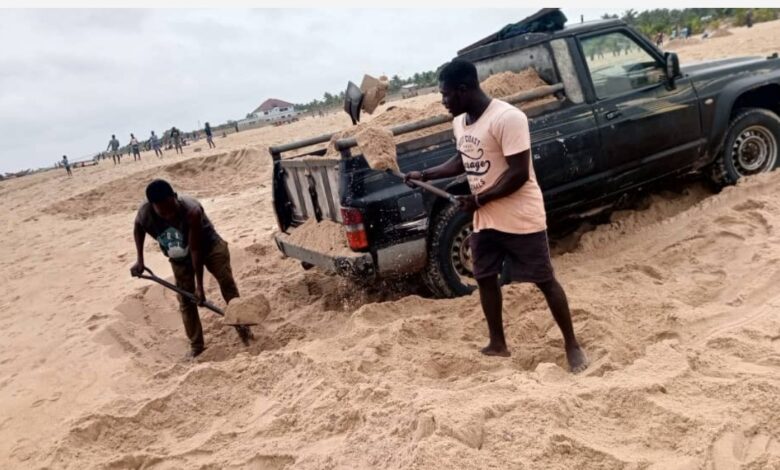Sand Winning: The Habitual Practice Disfiguring Southern Volta’s Coastlines

The once-picturesque coastlines of Southern Volta are being ravaged by illegal sand winning—now dubbed “sand galamsey.” What was a haven for beach lovers and a natural shield for communities is rapidly eroding into a landscape of environmental ruin and social despair.
A lucrative but destructive trade
In communities such as Keta, Anloga, Tegbi, Dzita, Havedzi, Vodza, Amutsinu, and Salakope, sand winning has become a normalized cultural practice. Despite being outlawed, it remains a lifeline for many unemployed youth who see it as their only means of survival.
Mensah (not his real name), a sand winner of ten years, told the Ghana News Agency that lack of opportunities pushed him into the business.
“With this sand galamsey business, I’m able to support my wife and pay for my three children’s education,” he explained, adding that nearly 95 percent of buildings in the area are constructed from sand mined directly from the beaches.
Driven by the booming construction industry and the high demand for cheap sand, the trade continues despite its devastating effects.
Environmental and social costs
The ecological consequences are alarming. Sand winning strips the coastline of its natural defenses, exposing communities to tidal waves and accelerating coastal erosion. Studies show the Keta coastline is receding at an average of 2.2 meters annually—far above the West African average of 0.6 meters. In some areas, erosion reaches six meters a year, wiping out homes, farmlands, and livelihoods.
Albert Derrick Fiatui, Executive Director of the Centre for International Maritime Affairs, Ghana (CIMAG), warns that if unchecked, parts of the Keta coastline could vanish within a few years.
Beyond the environment, the social impact is profound. Fishing, the backbone of coastal livelihoods, has been disrupted, while tourism—once a thriving industry—faces severe setbacks as hotels and resorts battle destruction. Communities such as Fuveme, Amutsinu, and Abutsiakope have already lost homes and entire neighborhoods to the encroaching sea.
Enforcement gaps and calls to action
Though sand winning is banned, weak enforcement and poverty-driven demand continue to fuel the trade. The Environmental Protection Authority (EPA) has repeatedly warned that sand extraction without a license violates the Environmental Protection Act, 2025 (Act 1124).
Professor Nana Ama Brown Klutse, EPA’s Chief Executive, stresses that Keta’s low-lying geography makes it especially vulnerable to coastal erosion and sea surges. Municipal and district authorities have appealed to security agencies for stronger enforcement, while promising alternatives such as regulated sand pits outside the coastal zone.
Alternatives and sustainable solutions
Experts and community leaders insist that enforcement alone is insufficient. They advocate for alternative livelihoods—training programmes, small-scale business support, and community engagement—to wean the youth off destructive sand mining.
Mr. Mawuli Joel Degue, a geographer and tourism promoter, notes that “protecting the coastline also means protecting fishing, tourism, and the very survival of our communities.”
Sustainable development, stakeholders argue, requires balancing economic needs with environmental preservation. Protecting Ghana’s 550-kilometre coastline is not just about safeguarding biodiversity, but also about ensuring food security, tourism potential, and long-term economic stability.
The way forward
The consensus is clear: Ghana has the ideas and laws, but lacks consistent enforcement. A coordinated effort by the Ministries of Environment, Local Government, Fisheries, and related agencies—working with traditional authorities, local assemblies, and civic educators—is urgently required.
As the waves inch closer and communities shrink, time is running out. Protecting the coastlines is not a luxury—it is a necessity for survival. The destruction caused by sand winning will take centuries to repair.
A word to the wise, indeed, is enough. Time and tide wait for no one.
GNA




